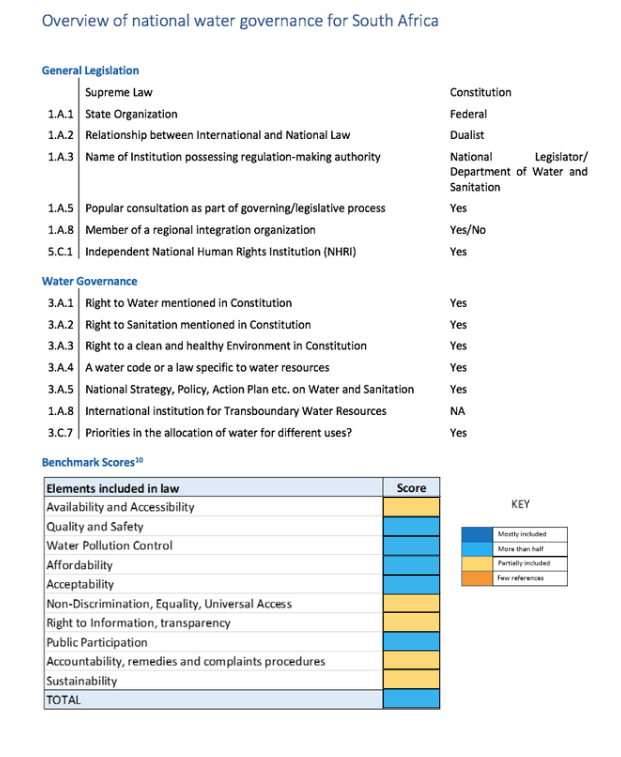Potable water is clear, tastes and smells good, and is free of contaminants and pollutants that could affect human health. South Africa scored well on the legal assessment developed by HR2W to determine how the human rights to water and sanitation (HRWS) and the human right to a clean and healthy environment (HRHE) support each other in the legislation. The country has directed significant efforts in its legislation to ensure the quality and safety of drinking water for its citizens. For detailed references and analysis please download the full report here.
This national assessment provides an overview of water governance. South Africa is a parliamentary republic with several water resource authorities and stakeholders such as the Department of Water and Sanitation (DWS) to help ensure the country’s water is sustainably protected, managed, controlled, used, and developed. The DWS has also been responsible for creating other mechanisms that support water conservation.
This gap analysis identifies the legal instruments that the country has ratified through regional and international treaties. It includes domestic water and environmental law, as well as the legislation for its extraction and use. The dashboard summary of South Africa is pictured to the right with reference to how the HRHE and HRWS have been included in the constitution.

The review includes a detailed analysis of the SDG 6 Targets and the overview (the table in the picture on the right) provides a summary of how well the laws and policies of the country support the criteria and principles of the HRWS. It can be seen that significant efforts have been made to develop laws to ensure water quality, affordability, and acceptability. It can be noted that South Africa has also put many of its efforts into controlling pollution and promoting public participation in the decision-making process.
The final section of the report looks at the administrative procedures for complaints and the judicial processes. South Africa has many of these mechanisms in place to allow remedies and complaint procedures to take place when any HRWS and/or HRHE issues are identified and brought forward to the court. Lastly, there is a South African Human Rights Commission responsible for promoting and protecting human rights which is authorized to receive and adjudicate complaints of HRWS violations.
For detailed references and analysis please download the full report here.
Disclaimer: This is not a statement of compliance nor a legal review of this country. White & Case has provided valuable pro bono assistance for this project but bears no responsibility for the benchmarking of countries in the dashboard which reflects the sole view of Human Right 2 Water.

